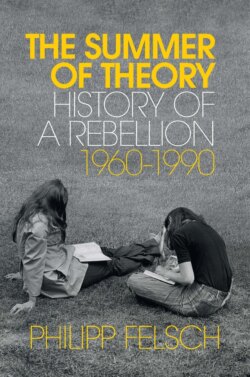Читать книгу The Summer of Theory - Philipp Felsch - Страница 14
In the Literary Supermarket
ОглавлениеPeter Gente was fascinated with Adorno to such a point that he wanted to read everything the man wrote. Starting with his gateway drug, Minima Moralia, he systematically worked his way backwards to the early writings on musical aesthetics, some of which were difficult to find at that time, before the Suhrkamp edition of Adorno’s collected works. Library research was necessary to reconstruct the theoretical context. Gente collated bibliographical lists as meticulously as he had kept his cultural diary (now abandoned), copying out tables of contents on the typewriter and making thick, gum-bound Xerox copies which are now almost completely faded.
And, while catching up on Adorno’s past publications, Gente also had to keep up with his current production. What with the author’s growing popularity and presence in the West German media, that was a time-consuming task. Together with a handful of like-minded readers – who were thought nuts by their fellow students – Gente formed an ‘information syndicate’ to lay hands on everything Adorno published, no matter how obscure the outlet. ‘He’d just written something in Neues Forum, so I ran to Schöller’s and bought it.’45 (Marga Schöller’s historic shop in Knesebeckstrasse was where West Berlin’s revolutionary students bought their literature before the little Red bookshops usurped the market.) The thick dossier Gente compiled as an Adorno fan would later become his seed capital as a publisher. His theory archives grew more diverse with each passing year, and eventually spawned the first Merve titles.
Among the earliest articles Gente clipped and filed is a commentary by Adorno on the 1959 Frankfurt Book Fair. In it, Adorno expressed a vague ‘anxiety’ that had oppressed him for some time at the sight of each season’s new publications: it seemed to him that the books no longer looked like books. The covers had become ‘advertising’, degrading the reader to a consumer as they made their advances. They heralded the ‘liquidation of the book’ in ‘all too intense and conspicuous colours’. A proficient stylist, Adorno needed no more than two columns to run the gamut of his cultural criticism: the diagnosis of death where life only appeared to persist; the successive moments of horror, realization and despair. For Adorno would not be Adorno if he did not finish with a dialectical sidestep and declare the industrialization of the book market inevitable. The melancholy over the deterioration of a cultural artefact ‘in which truth presents itself’ was all the deeper for that.46
Every new medium has kindled in its turn the apocalyptic discourse of the death of the book – television, in particular, and later the screen culture of the digital age.47 In the post-war period, that discourse was first heard as a critique of the paperback book. In the same year in which Adorno reported on the Frankfurt Book Fair, the Hessian radio network broadcast Hans Magnus Enzensberger’s ‘analysis of paperback production’, an examination of the leading German publishers’ catalogues. Rowohlt’s rororo series, named for the mass-producing rotary printing press, had entered the German market as early as 1946. From then on, paperback production had only grown, in all segments of the industry. In his critique, an attempt to grasp the significance of the paperback phenomenon, Enzensberger essentially came to the same conclusions as Adorno. He, too, saw intellectual culture deteriorating to a commodity, the reader demoted to a consumer. Of course, the fear that cheap paperbacks would be not so much read as briefly leafed through and then stuffed back onto the shelf, or even thrown away, was not limited to Germany. It was a common motif of cultural criticism wherever publishers pressed forward into the new book market – in Paris and Rome no less than in Frankfurt. The paperback seemed to be a harbinger of the global ‘mass culture’.48 What worried Enzensberger most was the reader’s disenfranchisement: he thought the flood of new titles robbed readers of their ability to judge. In the ‘literary supermarket’, where anticipated sales took the place of the cultural canon, helpless readers were prey to the manipulations of the culture industry.49
Neither Enzensberger nor Adorno could have imagined in 1959 that they would owe their own success as authors to the generation of paperback readers.50 Once Minima Moralia appeared in a soft cover in the early 1960s, no one carried it around in hardcover any more. Adorno later attained high sales figures in the various paperback series published by Suhrkamp. The new medium, which, from its critics’ perspective, ensured the conformance of the consumer, was supplying difficult ideas – initially as contraband – to a growing readership.51 The history of theory is not conceivable without these upheavals in the book market, and that is what makes Peter Gente, the book collector and book producer, such an exemplary figure in that history. It was the Penguin designer Hans Schmoller, a German-Jewish emigrant, who remarked in 1974 on the paradox of the ‘paperback revolution’: ‘though in the West paperbacks have become big business, this has not prevented their publishers from giving free rein to expressing ideas strongly opposed to established political and economic systems and indeed advocating their overthrow’.52
